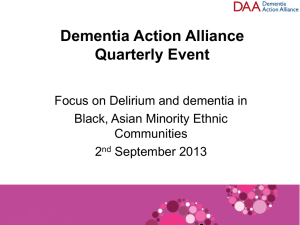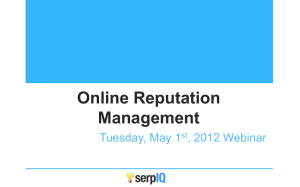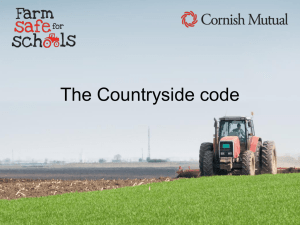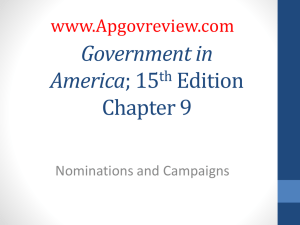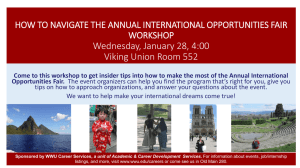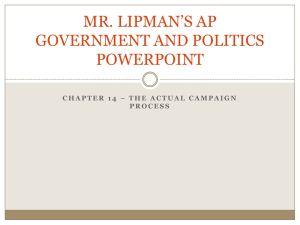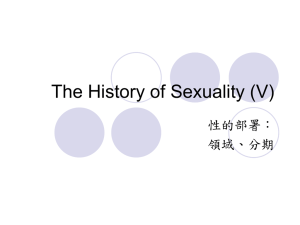AS Pressure Groups
advertisement
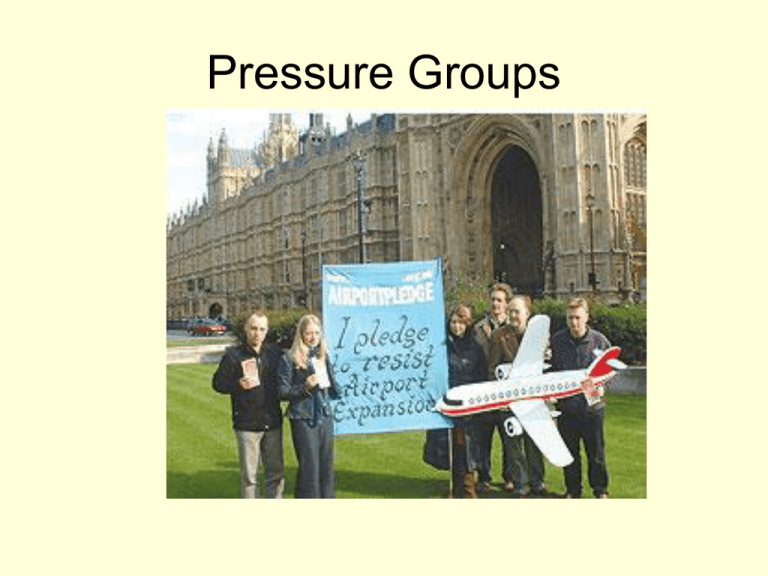
Pressure Groups Defining pressure groups • • • • • An organisation which seeks to influence policy and details of a comparatively small range of public policies do not seek to make those decisions themselves…. When the Countryside alliance knew it could not prevent ban hunting with dogs 2003-4, sought instead to influence details of legislation. Pressure Groups operate on different levels of government- e.g. level of ministers and civil servants, Westminster or regional assemblies, parliament, Local Government, EU, Judiciary and the courts. Having lost the anti hunting legislation in Parliament, the Countryside alliance 2004 tried to get courts to rule the legislation was invalid- again failed and returned to Parliament post 2011 to get legislation overturned. Pressure Groups have representative function- Some represent professional groups or another category some a much wider constituency- environemenatlistss or anti smoking lobby, Campaign for Batter Transport. Educative- raise awareness of issues- Countryside alliance aim to raise awareness of problems those in rural areas, Liberty and Unlock democracy aim to promoote human rights. Pressure Groups can provide a means for public engagement with the political process on a less intense level than membership political process than a party. Presssure groups deal with narrower issues whereas parties require support across whole spectrum of public policy. Functions • Help to inform government and ensures interests and views of public are considered in policy thereby improve quality of policy making. • Representative- Either via represent specific sections of public or claim to represent best interests of community as a whole. • Educate and inform about politically important issues. • Less intensive but more relevant opportunity for political participation than political parties can. • Scrutinise legislative and policy proposals. • Tension release- provide outlet for feelings significant sections fell very strongly about. Opposition to 2003 Iraq war, hunting with dogs, airport expansion etc. Similarities and differences with political parties • • • • • Similarities Both attempt to influence policy Both are representative claiming to channel communication between sections of the community and those who govern. Both try to mould and mobilise public opinion. Some pressure groups do feel need to transform themselves into a partyTrades Unions formed the LRC 1900 and British Ecology Movement eventually created the Greens.. UKIP was a pressure group 1990s. • • • • • Differences Pressure groups do not seek political power. Parties therefore have to address full range of political issues Parties must accept responsibility for policies they propose and governments are accountable for what they do- Greenpeace can oppose GM crops without having to be accountable it might condemn millions to starvation. ASH campaigned for ban in smoking public places it did not have to be responsible for loss government revenue. If a pressure group contests elections single issues parties such as Animals Count and Senior citizens party 2010 was to raise awareness and publicity. Classification of groups • • Sectional or interest Represent a specific section or group and are self interested e.g. unions. Others represent other economic sections such as Taxpayers’ alliance or NFU or people with specific conditions- Multiple Sclerosis society or the Heart Foundation, also those which represent sports, pensioners, children etc. • • Cause or Promotional Claim not to represent specific group but serve the interests of whole community, often do not have a specific membership but a small group of activists. Environmental groups- Greenpeace, Friends of the earth, RSPB National trust. May also be temporaryAnti poll tax Federation 1989-90 • Dual-Function May be both sectional and cause based. Countryside alliance represents people who live in rural areas but campaigns for better quality of life in countryside to benefit all. Also here are groups such as AA or unions which perform specific service for members but also campaigns within the political system on their behalf. . Groups such as NSPCC and cancer research seek funds and legislation to help those whom they serve and offer wide range of services and expend much effort in Rising finance. • Difficult to define groups- IRA are terrorist groups pressure groups? Think Tanks such as the Adam Smith Institute which researches issues covering free markets arguably are PR groups but will not be considered as such. Insider groups • • • • • • • It has become part of the decision making process. They can take part in development of policy and hope to mould it… They may be consulted regularly by government. They can provide government with useful information and express views of members- CBI produces reports on how businesses operate and what are its attitudes towrds issues such as business taxation, employment regulations, trade and economic policy etc… Also informs govt about how business perform regarding investment, sales expectations, exports production costs. Some are insider because permanent seats on govt policy cttees and agencies putting them at centre of decision making process- NFU. They are insider if set up by govt and funded by tax money and are part of govt not just insiders Commission for Equality and Human rights, Office of Fair trading Insider groups often called to select cttee hearings and so have an input in making govt accountable. European insider groups such as unions and business employers’ orgs attach themselves to various sections of European Commission which develops EU policy and operate extensively with European Parliament which has inc impact policy also seek to gain insider status with the devolved bodies. Insider groups by implication and necessity must act in certain way- have to act within parliamentary system and are therefore constrained in their range of possible methods. There is also a danger they will lose independence and adopt same policies as their political contacts and this might disillusion their members. Outsider groups • Unlike insider groups these have no special links with govt but seek to influence decision my mobilise public opinion. • A group may seek to be outsider to retain freedom of action. Greenpeace undertakes acts civil disobedience. • A group may not have been invited into the governing process- aspiring insiders. Association of British Drivers would but relatively young group. • There might be conflict with Govt policy- unions were shunned by Mrs T and post 1997 could not fully regain insider status as Labour Govt want to retain business pressure groups as insiders. New Social Movements • • • • • • • • 1980s- fairly informal which emerges rapidly sometimes around a particular issue. Mass demos and media campaigns design for maximum publicity internet and mobile phone texting has greatly assisted their rise. First example of these was Anti poll tax Federation organise often violent protests and tax strike. 2000 sharp rise in fuel prices led to people's fuel Lobby- farmers, motorists, road hauliers etc blockading fuel depots and main roads. Countryside alliance another although now a proper Pressure group seeking insider status. Anti war Coalition 2002-4, Make Poverty History (latter now part of Global call to Action against Poverty) now known as the Anti-Globalisation Movement, 2007 climate Camp at Heathrow. 2007 when Downing street accept e-petitions Association of British Drivers 1.8m signatures against road pricing scheme. NSMs often locally based campaigns to save hospitals, prevent new roads, protect green belt. Global groups in areas such as environmental protection , human or animal rights concentrate on international conferences. Are mass movements with thousands of instant followers, loosely organised, narrow range or single issue, followers tend to have intense attachment to issue, often temporary. Pluralist Democracy and pressure groups • Pluralism is a political system a wide range beliefs, ideas, ideologies is tolerated and where power is widely dispersed. • Pressure groups offer a considerable amount of information to people, by definition are independent of government. • They represent interests of the people to those who govern. • Political activism is important in preventing excessive accumulation of power and ensuring that govt remains accountable. With decline in popular involvement in political parties, pressure groups provide vital opportunity for participation. • Protect minority interests by ensuring all of us are taken into account thereby preventing the tyranny of the majority. • Dispersal of power. Governments and parties tend to concentrate power in leaderships whereas pressure groups can empower wider memberships, representing the full range of the population they allow many voices to be heard Undemocratic features of pressure groups • • • • • Disproportionate influence some sectional groups a disproportionate influence- farmers because a strategic resource- food exert disproportionate influence. Transport, emergency and medical workers again because of the roles they perform. Influence of the financial sector in wake of public criticism 2007-8 on part finance plays to the economy thereby preventing imposition serious controls on banks. Some groups have more funds than others- groups which represent employers and business. Wealthy groups such as companies donate to political parties- cash for peerages scandal 2006-7. Size- 2003 Countryside alliance put 300 000 protestors onto the streets to protest against hunting bans. Concentration of power. Some groups concentrate power- banking lobby and producer groups representing major industries which represent shareholders and management rather than the workers. Lack of internal democracy. Party politicians are made accountable through the electoral process and representative institutions whereas democratic controls on groups are weaker. Methods • • • • • Lobbying. Much of this is hidden. Insider groups lobby at committees, commissions , consult with ministers, providing MPs and peers with information or with help in scrutiny legislation. Outsiders may attempt to lobby policy makers directly but less access than insiders. Parliament- Some groups pay retaining fees to MPs, where MPs have freedom to act independently they engage in group politics. Following reforms of the Lords, greater PR group focus there, significant amendments on university tuition fees, foxhunting ban protection human rights and pub licensing. Greater degree of independence in Lords c/f commons. 2010 on Equality bill- coalition Christian churches secure amendment allow them to exclude gay people. Direct Action-Raises publicity and attracts support- 2003 Anti war alliance, Countryside Alliance, expansion Heathrow/Stanstead, anti globalisation campaigns at international conferences, stunts by Fathers4Justice. Anti fuel tax lobby which blockades oil depots, Greenpeace destroy GM crops and Animal Liberation Front freeing animals and threatening lab workers. Disabled people Against the Cuts August 2012 outside HQ Atsos over sponsorship of Paralympics by Atsos it assesses disability claims. Public opinion- declining public attachment to parties gives PR groups leverage as they can claim to represent opinion- 2005 election Age UK able to force concessions by party leaders on pensions, council tax rebates, crime. 2010 Taxpayers’ alliance and business groups exploit opportunity to raise awareness. Plane Stupid success in publicise environmental dangers increase air transport. Media plays key role mobilise opinion therefore many groups employ professional public relations operators. The People’s Pledge formed 2011 deliberately appeal beyond party politics to capitalise on cross party support for a referendum on the EU. It was keen to distance itself from exclusively right wing Euro sceptic Little Englander position. Drawing up an 18 month programme of local referendums 11 2012 and 100 next year question was whether there should be a referendum on EU- aim is to apply pressure on MPs. September 2012 Save the children has launched its first domestic fundraising appeal to help UK families in poverty related to cuts and recession- slogan shouldn’t happen here – Methods include publishing researchsignificant number of households where parental income £30 000 willing to skip meals, go into debt, avoid paying bills, put off replace worn out clothing to feed children. Why are some groups more successful • • • • • • • • • • If group’s beliefs and aspirations close to that of the government- Business groups under Conservatives and new labour whereas unions lost out. Liberty and Unlock democracy saw decline in influence as governments have aimed at more authoritarian policies. However a newish group Mumsnet established c2000- aims at promoting interests of parents and families. Because women are perceived as floating voters, they can be a key to electoral success- election of 2010 dubbed the mumsnet election. David Miliband is a regular Mumsnet blogger and David Cameron came on in 2006. It also attracts retailers and manufacturers to its site. The popular site’s influence on high-profile campaigns such as better miscarriage care, respite for parents of disabled children, against sexualisation of children. Note the failure of the antituition fees campaign- violence by students in London- if the NUS had put more effort into building a wider coalition of the usual and usual suspects it could have been more successful- for the Tories a U turn not on the cards and the campaign was an embarrassment for the LibDems.. Consider failure of squatters' groups such as Squash which campaigned against the 2012 law which criminalised occupation of a residential building. Finance- many groups representing farming, oil, supermarkets, banks spend large sums on lobbying either behind scenes or public campaign- no guarantor of successunions. Size- large groups such as FOE (200 000) and Countryside alliance (100 000), AA and RAC each have millions of members can claim to represent public opinion and size can translate into funds. Also Age UK- elderly more likely to vote 70-80% c/f under 40% under 30s. However, UNISON 1.2m and AMACU 1.1m decline influence 1980s+. Mumsnet attracts politicians to comment because it has c 40M monthly page reviews and close to 5M monthly visits. Organisation-Countryside Alliance, Plane Stupid, Greenpeace success because well led, captured imagination public and media. Lack of Opposition- where a counter group emerges there is a battle of wills and decline influence but where it does not helps the group. Old age pensioners, poor families and financial establishments. Insider status Celebrity Involvement-2009 Joanna Lumley on behalf of the Ghurkhas on their right to settle in UK on retirement- Ghurkha Justice campaign. Also Elton John on gay rights and Sadie Frost anti fur trade. Also the past 18 months- twitter-driven We Are Spartacus campaign against cuts in disability payments- winning support from celebrities such as Stephen Fry and Alastair Campbell took the mainstream media by surprise- two days after it was launched the Coalition Government lost three votes in an evening in Lords on welfare reform.- by the end of the week- one of the leading lights of the campaign debate live on BBC with employment minister Chris Grayling. The Hope Not Hate Campaign (anti racism) supported by Eddie Izzard, Billy Bragg etc on board- helped in their targeting of Barking and Dagenham BNP strongholds where over a six week campaign the campaign had over 1100 volunteers of whom c37% either never involved before in political activity or not for five years- helped by celebrity involvement. Hugh Grant in 2012 to set up Hacked-Off to campaign for press reform in light of Leveson inquiry- involvement of high profile figures and publicity may explain reluctance of press to publish pictures of naked Prince Harry at Las Vegas although Sun did print image of a naked man with headline Harry grabs the Crown Jewels- image (not Harry) was clutching his scrotum. Successful campaigns and campaigning organisations look beyond those already on side. The Save Our Forests campaign forced a ministerial U turn because it built a broad coalition uniting left and right. Hard left socialists joined with Daily Telegraph readers and household names such as Archbishop of Canterbury and Judie Dench. Also consider the success of Make Justice Work ( campaigns for raise awareness ineffectiveness of short prison sentences)- It commissioned a national enquiry chaired by a conservative commentator Peter Osborne. It looked into a number of alternatives to custodial sentencing finding that effective community sentences are effective punishment and forms of rehabilitation. Given that its report was not just one by a criminal justice campaigner enabled it to converse with people it needed to get on board. The Hope Not Hate Campaign (anti racism) targeted Barking and Dagenham where BNP support strongest. Ability to capitalise on new methods of communication- note We Are Spartacus Campaign- this was not a traditional campaign which started with a letter to leading national paper or at a meeting in a civic hall and grown through a charity lobbying campaign . It grew rapidly and lived through social media networks bringing together and giving voice to thousands of people excluded from mainstream media and politics. It was partly a recognition that traditional activist techniques no longer guaranteed traction with politicians and media and partly pragmatic- illness and disability meant many activists were confined at home but were able to engage through social media – bedtivism Pressure groups which bring to public attention key issues affecting civil rights- Big Brother Watch has attracted support of the Coalition Government for its comprehensive study of the use of RIPA powers intended to combat terrorism but which are used by councils without any official sanction as a result councils will from autumn 2012 require approval of a magistrate before RIPA powers granted for covert surveillance. NO2ID has revealed extent of files held by police forces across UK on unconvicted people. Changing nature and activities pressure groups • • • • • • • Declining voter turnout and party membership as there has been a shift towards PR groups and specific issues. Access Points- EU, new centres of power and influence created by devolution, growth of policy making bodies, increase importance of courts as result HRA. EU- growing importance means pressure groups increasingly focus here- 2010 4400 lobbyists attached to EU. Pressure groups often affiliate with similar groups across the EU e.g. Friends of the earth Europe, European Small Business alliance, European Association for the defence of Human Rights etc… Devolution has meant that as internal administration and legislative power has shifted from Westminster pressure groups shift activity- Cymuned (Communities and Yes for Wales (greater legislative powers) Scottish Council of Single Homeless, also in Scotland WWF and Greenpeace, Muscular Dystrophy NI which campaign for coordinated medical services for 2000 sufferers in the Province. Growth of extra party institutions such as think tanks which influence policy- pressure groups seek to influence early stages of policy therefore often employ professional lobbyists. HRA designed to reinforce existing rights and to protect minority interests provides groups with new opportunities to assert their interests. Liberty is especially active as are environmental groups. Direct Action- modern governments are responsive to mass political movements provided they can demonstrate widespread support- Countryside alliance and pensioner groups.


